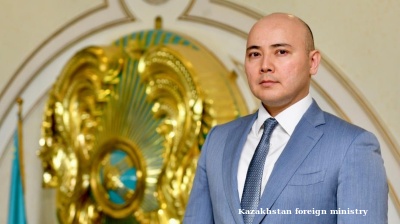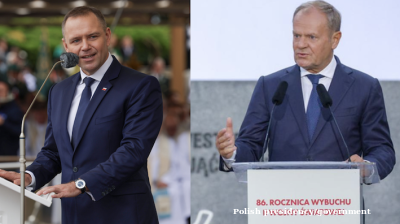The European Union is considering the unprecedented step of adopting US-style secondary sanctions as part of the nineteenth sanctions package currently under review.
The EU has never imposed secondary sanctions, whereas the US makes frequent and effective use of them. Europe has issued eighteen rounds of sanctions, but as bne IntelliNews reported they have been largely ineffective. By contrast, under the Biden administration the US has issued very effective harsh oil sanctions and US financial sanctions that wounded Russia’s ability to do international business.
The idea of secondary sanctions came up following a call between US President Donald Trump and the coalition of the willing European leaders following the Paris summit on September 4, which ended in disaster. Instead of getting the White House on board for plans to send a peacekeeping force to Ukraine, the EU leaders received a tongue lashing from the US president who told them to stop importing so much oil and gas from Russia and to pressure China to cut its imports as well.
The US has already imposed an additional 25% tariff on Indian imports to punish it for continuing to buy Russian crude. Trump threatened China with a 100% tariff for doing the same but has pushed the deadline to comply back to November and is widely expected to balk at actually imposing the tariff.
Europe doesn't have these sorts of capabilities. It currently has no mechanism for imposing tariffs or sanctions on China for doing business with Russia. Putting them in place will be very difficult as the measures would require the approval of all 27 member states, including Hungary and Slovakia, which are routinely vetoing all efforts to impose new sanctions on Russia.
On the docket for the new sanctions are Russia's financial and energy sectors amongst other things, which could impact banks, energy companies, payment systems, crypto exchanges, and ports.
The EU plans to coordinate several measures with the US as part of a new secondary sanctions regime, and a delegation of officials from the bloc will head to Washington this week for talks.
US Treasury Secretary Scott Bessant has already said that the US is ready to ramp up pressure on Russia, expecting Europe to act in tandem. However, Trump himself has been extremely reluctant to impose any sanctions on Russia, saying that he believes new sanctions will endanger the current attempts to call a ceasefire in the Ukrainian conflict. Since taking office Trump has imposed no new sanctions on Russia whatsoever and has let seven deadlines pass without taking action.
The US is also weighing new restrictions on Russia's fleet of shadow tankers and on energy companies Rosneft and Lukoil. The EU is discussing additional measures against Russian vessels and traders in third countries. The previous US sanctions on shadow fleet tankers proved to be amongst the few effective sanctions imposed so far.
The EU is also considering toughening restrictions on large Russian oil companies by removing current exemptions, as well as introducing new export bans on goods and chemicals for the military-industrial complex and trade restrictions on foreign suppliers, particularly in China and Kazakhstan, UBN reports.
An official presentation of the sanctions package is expected soon. However, experts note that despite new sanctions, Russia's shadow fleet continues to grow, albeit at a slower pace this year, as new vessels replace those that have been rendered inactive due to sanctions.
The major change in the eighteenth sanctions package was the introduction of a floating rate oil price sanctions cap of 15% below market rates for the Urals blend, Russia’s main export product. The new system came into effect on September 3, dropping the effective price from $60 to $47 per barrel. The change was partly designed to prevent EU-regulated Greek tankers from carrying Russian oil, which embarrassingly make up a fifth of Russia’s “shadow” fleet. As of the time of writing Urals oil was trading at $60.12 per barrel. Greek shipping companies have been profiteering from the war, legally transporting Russian oil in exchange for the fat premiums that Russian companies are willing to pay for their services. Likewise, China and India continue to import large amounts of Russian crude, taking advantage of the up to $20 discounts to market prices Russian companies offer per barrel.
The introduction of secondary sanctions targeting countries that continue to buy Russian oil, including China, is designed to stop this business.
According to The Bell, “the Europeans are trying to implement the first-ever secondary sanctions in the EU’s history” in an effort to align with the US as Brussels desperately tries to keep the Trump administration on board with its efforts to support Kyiv in its fight with Moscow.
Negotiations remain at an early stage, The Bell reports. The idea of penalising third countries emerged in late August in the context of sanctions-busting imports. Now, “this idea is being transformed — most likely after the telephone conversation with Trump of the leaders of the ‘coalition of the willing’, where France and Great Britain hold leading positions,” The Bell reports.
For Brussels, the challenge is twofold. Secondary measures would need unanimous backing from all 27 member states, including Hungary and Slovakia, but at the same time, the EU is reluctant to act without reciprocal American measures, which so far have not been forthcoming. The EU is unlikely to act on its own, analysts say.
Even after the Alaska summit on August 15 with Vladimir Putin, Trump insisted negotiations with Russia were proceeding “successfully” and suggested new measures could wait. But Trump is also losing his patience with Putin. On September 7, Trump declared he was ready to move to a “second phase” of sanctions against Russia, though without clarifying what this would entail.
Features

INTERVIEW: Kazakhstan repositions as a diversified investment destination
Kazakhstan is doubling down on its drive to attract high-quality foreign investment, said Deputy Minister of Foreign Affairs Alibek Kuantyrov in an interview with bne IntelliNews.

Stumbling blocks hinder plan to build Trans-Afghan Railway connecting Uzbekistan to Pakistani seaports
Security risks, financing challenges, difficult terrain and lack of recognition for Taliban among headaches.

PANNIER: Tensions creep into rebuilt Tashkent-Bishkek relations as Uzbek border guards shoot dead two Kyrgyz men
What's known indicates victims were gathering medicinal herb unaware they had strayed across frontier.

Kosovo’s flawed electricity market liberalisation leaves businesses in the dark
Companies face disconnections, uncertainty and higher costs, Kushtrim Ahmeti, executive director of the Chamber of Trade and Industry of Kosovo, tells bne IntelliNews.



